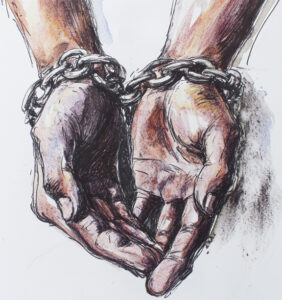 While slavery is still practiced around the world, it is now broadly seen as evil. While apologists for slavery are relatively few, there remains the question as to why slavery is evil.
While slavery is still practiced around the world, it is now broadly seen as evil. While apologists for slavery are relatively few, there remains the question as to why slavery is evil.
It is tempting to define the wrongness of slavery in terms of exploitation and abuse. While such abuse and exploitation are wrong, they are not adequate in explaining the wrongness of slavery itself. This is because abuse and exploitation can exist apart from slavery, thus showing that these are not sufficient conditions for slavery. Being abused and exploited does not entail that one is a slave. Examples of such abuse and exploitation are, unfortunately, abundant. If you work for a living, you are most likely exploited but you are almost certainly not a slave. Countless people suffer abuse in relationships from the very people who should be kind to them.
Abuse and exploitation are also not necessary conditions of slavery. That is, a person can be enslaved without being abused or exploited. As noted in an earlier essay, there have been slaves who have enjoyed considerable power and status. Despite their status and power, such slavery is still wrong. As such, it is not the abuse or exploitation that makes slavery wrong.
This is not to say that abuse and exploitation do not matter. When present, they compound the basic evil of slavery and make the bad even worse. Slavery is also strongly connected to abuse and exploitation. The belief that enslaved people are property makes it easy for others to justify and get away with abuse and exploitation. While free people are abused or exploited, they usually have more legal protection than the enslaved. So, while the abuse and exploitation matter, slavery serves as an enabler of mistreatment, and this contribute to the wrongness of slavery.
What makes slavery morally wrong, then, is that it is perceived as transforming people into objects that can be owned. The claim of ownership over another person is the denial of their personhood and all that goes with it. For those with liberal Lockean inclinations, this denial of personhood is a denial of the basic rights to life, liberty and property. Since a slave is supposed to be property, their life supposedly belongs to the owner. Hence, slaveowners usually see themselves as having the right to kill or harm their slaves. I do not deny that slaves are sometimes protected by laws and slavery does come in degrees. But every form of slavery must assume that the owner has ownership over the life of the slave and can use compulsion to maintain slavery.
Slavery, by its very nature, is a violation of a person’s liberty. They are denied freedom of choice and denied agency. As the owner sees it, they have the right to make decisions for their property such as what work they do, who they have sex with, and what faith they might follow. This is not to say that slaves do not have some freedom or that free people are completely free. It is to say that the freedoms of slaves are limited and often restricted to minor decisions. As noted above, slavery does admit of degrees and in the past some favored or high-status slaves might enjoy considerable liberty. For example, a Mamluk ruler might enjoy greater liberty than a non-slave in their empire. It can be objected that such a slave would be a slave in name only. After all, a person of such status and power would be far better off than most despite being a slave. The challenge to those who argue that slavery is inherently wrong is to show that such an exalted slave is still wronged by their slavery. One approach is to appeal to the intuition that however exalted, the slave is still a slave. That is, regarded as property rather than a free person and this is inherently wrong.
Being regarded as property, slaves often cannot own property of their own. After all, being owned entails that their owner owns what they own. There are, of course, exceptions to this and sometimes slaves are paid for their work and can even eventually buy themselves out of slavery. While this does show, once again, that there are diverse types of slavery, the idea that a person should need to buy themselves seems absurd on the face of it.
Thus, while slavery does enable a multitude of evils, the core evil of slavery is the belief that a person can be owned as an object.
